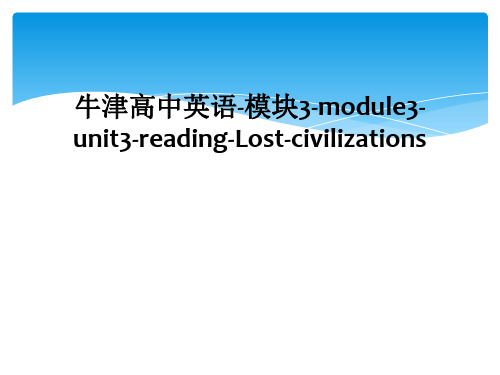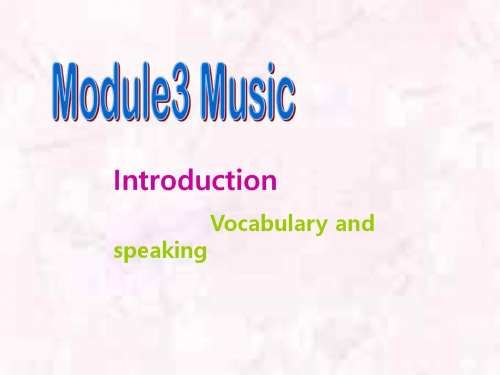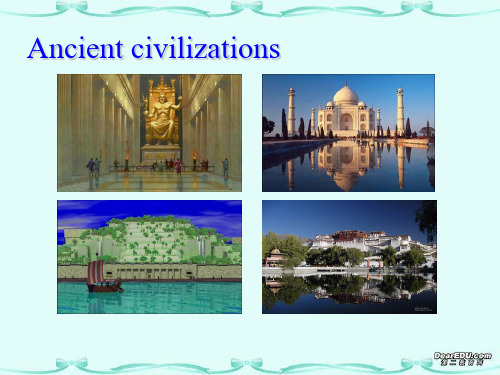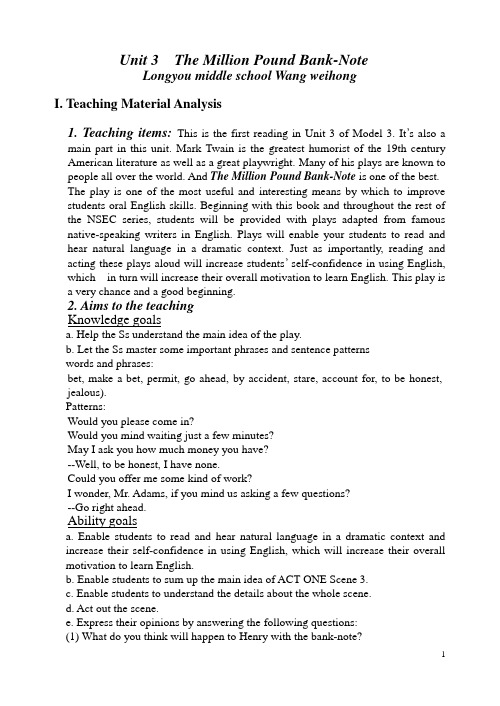14-04-17高一英语《module3_unit3_project2+workbook练习讲评》(课件)
- 格式:ppt
- 大小:317.50 KB
- 文档页数:24





英语高一必修三unit3知识点第一节:Unit 3知识点之词汇英语的词汇是学习的基础,掌握好词汇是提高语言表达能力的关键。
在高一必修三的Unit 3中,我们将学习到一些重要的词汇。
首先是与“依赖”相关的词汇。
在现代社会,人们总是依赖于各种各样的东西。
例如,“rely on”表示依赖,在句子中常用来表达我们对某人或某物的信任和依靠。
此外,还有与之相关的短语,如“depend on”和“count on”。
其次是“学习”和“教育”的词汇。
学习是我们成长的过程,而教育则是这个过程的推动力。
在这个单元中,我们将学习到一些与学习和教育相关的词汇,比如“educate”表示教育;“knowledge”表示知识;“learn”表示学习;“teach”表示教授等。
接下来是一些描述人的特征的词汇。
在Unit 3中,我们会学习到一些与性格特征和外貌特征相关的词汇。
例如,“optimistic”表示乐观的;“pessimistic”表示悲观的;“shy”表示害羞的;“outgoing”表示外向的;“friendly”表示友好的等。
最后是形容词与副词的比较级和最高级。
在英语中,形容词和副词有比较级和最高级两种形式,用来表示不同程度的差异。
在Unit 3中,我们将会学习到一些形容词和副词的比较级和最高级形式,例如“better”和“best”表示“好”的比较级和最高级。
第二节:Unit 3知识点之语法除了词汇外,语法也是英语学习的重点之一。
在高一必修三的Unit3中,我们将学习到一些重要的语法知识。
首先是不定式。
不定式是一个由动词“to”加上动词原形构成的形式,它可以用作名词、形容词或副词。
例如,“to study”表示“学习”,“to be”表示“是”。
不定式在句子中常用来表示目的、原因、结果等。
其次是虚拟语气。
虚拟语气是用来表示不真实、假设或建议的语气。
在Unit 3中,我们将学习到一些常见的虚拟语气形式。
例如,“If Iwere you, I would…”表示假设,“It's high time that…”表示建议等。

Unit 3 The Million Pound Bank-NoteLongyou middle school Wang weihongI. Teaching Material Analysis1. Teaching items:This is the first reading in Unit 3 of Model 3. It’s also amain part in this unit. Mark Twain is the greatest humorist of the 19th century American literature as well as a great playwright. Many of his plays are known to people all over the world. And The Million Pound Bank-Note is one of the best.The play is one of the most useful and interesting means by which to improve students oral English skills. Beginning with this book and throughout the rest of the NSEC series, students will be provided with plays adapted from famous native-speaking writers in English. Plays will enable your students to read and hear natural language in a dramatic context. Just as importantly, reading and acting these plays aloud will increase students’ self-confidence in using English, which in turn will increase their overall motivation to learn English. This play isa very chance and a good beginning.2. Aims to the teachingKnowledge goalsa. Help the Ss understand the main idea of the play.b. Let the Ss master some important phrases and sentence patternswords and phrases:bet, make a bet, permit, go ahead, by accident, stare, account for, to be honest, jealous).Patterns:Would you please come in?Would you mind waiting just a few minutes?May I ask you how much money you have?--Well, to be honest, I have none.Could you offer me some kind of work?I wonder, Mr. Adams, if you mind us asking a few questions?--Go right ahead.Ability goalsa. Enable students to read and hear natural language in a dramatic context and increase their self-confidence in using English, which will increase their overall motivation to learn English.b. Enable students to sum up the main idea of ACT ONE Scene 3.c. Enable students to understand the details about the whole scene.d. Act out the scene.e. Express their opinions by answering the following questions:(1) What do you think will happen to Henry with the bank-note?(2) Will the bank-note help him or get him into trouble?(3) Do you think money is everything?(4) Do you agree that only money can bring people happiness?Emotion goalsBy reading the play,the students analysis and unearth the characteristics of the heroes in the play to learn the hypocritical aspect of the capitalism at that time and set up a right philosophy.3. Teaching important and difficult pointsTeaching important points1. How to interpret language through tone of voice and body language, gaining a greater appreciation of the various verbal and non-verbal ways in which language works.2. Discuss the questions:(1) What do you think will happen to Henry with the bank-note?(2) Will the bank-note help him or get him into trouble?(3) Do you think money is everything?(4) Do you agree that only money can bring people happiness?Teaching difficult pointsDiscuss the questions:(1) What do you think will happen to Henry with the bank-note?(2) Will the bank-note help him or get him into trouble?(3) Do you think money is everything?(4) Do you agree that only money can bring people happiness?II. Analysis of the Teaching Methods and aidAs we all know, the main instructional aims of learning English in middle school is to cultivate Ss’ basic abilities of listening, speaking, reading, writing and their good sense of English. In order to finish the teaching goals above, I’ll mainly use “Task-based Language Teaching Method”. To make the class a student-centered one, the students are encouraged to work in groups, so they have more opportunities to practice. I’ll let the Ss learn in real situations and finish the tasks by teamwork and individual activity. Teacher acts as an organizer, a listener and a helper. I will assign the tasks according to the students’ level and let Ss learn step by step. I’ll help the Ss to get a better understanding of the text and enlarge the Ss’range of knowledge, train their studying interests, and improve their abilities of using English.Aid is multi-media computer and a set of suit. Using the computer can open the Ss’ wide fields of vision and enlarge the capacity of lesson.III. Analysis of the Learning Method(1) To train them to study independently, Ss can collect some information, famous plays and playwrights on the Internet by previewing before class;(2) Guide Ss to master and use reading skills, skimming, scanning andcareful reading, and master student-centered vocabulary learning method by the context, text clues and their word knowledge;(3) Guide Ss to study English cooperatively It contains pair and group work. They can make a discussion and learn from each other. It can arouse students to think and to say what they want to. Study becomes more relaxed and pleased in this kind of environment.IV. The Time Table of Teaching Steps(1) warming up (3 minutes)(2) Pre-reading (5 minutes)(3) Reading (23 minutes)(4) Post reading (12 minutes)(5) Summary and homework (2 minutes)V. Teaching StepsStep 1. warming upPurpose: To train the students’ self-reading ability and warm up.(1)Self-study: Reading material on P23 About Mark Twain(2)Teacher-students activity:What’s the real name of Mark Twain?When was he born and when did he die?Do you know all the places where he lived?Can you name three of his famous stories?Step 2. Pre-readingPurpose: To form a better surrounding for students by speaking and discussions. It will provide situation and backgroundto read the play at the same time.(1) Teacher-students activity:1.T: If a rich person gives you a large amount of money to use as you like, for example, one million pound, what will you do? Why? (The teacher draws a picture on the blackboard.)(Students have a discussion on this question. Whatever choice students make here, they should be ready to offer their classmates a good reason for it.)(2) Group work. Do you want to know what happened to Henry Adams in THE MILLION POUND BANK-NOTE written by Mark Twain? Have you ever readthe story? Have you seen the movie? (The teacher plays the short video of the reading part)Step 3. While-reading.Purpose: To grasp the main ideas and some details of the text, while reading. I’ll guide Ss to use the reading skills andform the habit of reading.1. Scanning Get the students to comprehend the whole scene quickly and accurately and meanwhile help the students to form a good habit of reading. Teachers give the students a couple of minutes to look through the whole scene. Tell the students to read the text silently and then ask some detail questions about the text on the slide show with their partners. Teachers encourage the students to express their ideas.Teachers show the questions on the screen:1. How did Henry Adams come to England?2. Where did Henry work? How much money did he have?3. What did the two gentlemen give Henry?4. When can Henry open the letter?(Students read the whole scene (ACT ONE Scene 3) for three minutes and try to answer the questions.)2. Second reading: Reading aloudIn this part, students will read the text again and try to understand the sentences and the main ideas of the whole scene.3.ListeningIn this part, students will listen to the tape and try to find the characteristics of the whole scene. After that, teachers discuss the question with the students and then check the answer. And then the teacher as well as the students read the passage together, which will be served as the ground for the acting afterwards. T: Please listen to the tape and try to find the characteristics of the text. (Students listen to the tape.)Step 4 Post-reading1. Students read the whole scene again and again and try to act it out. First in small groups and then several are chosen to act it out before the whole class.2. Discuss the questions:(1) What do you think will happen to Henry with the bank-note next?(2) Will the bank-note help him or get him into trouble?Step 5 Summary and homeworkPurpose: To draw a conclusion of the text, train Ss to practice English after class and do some extensive exercises toconsolidate the knowledge they’ve learnt.T: Ok, class, what do you think of this play? Is money so important?T: Some people say that money is everything. What do you think of this opinion?T: But some people still think that only money can bring them happiness. What do think of this?T: So, class, we should have a correct attitude towards money. Now, let’s look at today’s homework.1. Try to write the next scene making full use of your imagination according to the question: What will happen to Henry with the bank-note?2. Review the words and sentences patterns of the text.。
模块3 Unit 3一、重点短语及句式1. take over 接管;夺取take in 吸收;欺骗take on 呈现take up 开始;从事;占去(时间、空间等)2. be buried in 埋头于……3. lie/be in ruins 成为废墟4. It remains to be seen + 从句……不得而知类似的还有It remains to be told …known …5. drive sb. mad/crazy/angry使某人发疯(生气)6.house sb.为某人提供住处7. be in good/poor condition处于好的/坏的状况on/upon condition that…在……条件下;假设……8.feed…on…以……喂……feed…to…用……喂给……feed A with B = feed B to A供……给……;输入be fed up with = be tired of厌烦be concerned about关心9. be concerned at/over为某事忧虑so/as far as…be concerned关于;就……而言10.carry out 执行,实现carry out a plan/promise 完成计划/实现诺言11. on board 在车/船/飞机上on the boards 当演员on the board 在那块木板上12. in memory ofin honor of 纪念13. fight fo r…为……而斗争fight against…为反对……而斗争fight ove r…因……而斗争14. be similar to…与……相似be similar in…在……方面相似15. in the form o f…以……形式;以……形状16. be known as 作为……而知名be known for 因……而知名be known to sb. 为某人所知17. do damage to 对……有害18. be covered with 覆盖着……(强调状态)be covered by (强调动作)19. prevent sb. (from) doingstop sb. (from) doingkeep sb. from doing 阻止干某事20. now that 既然,现在既已21. in return fo r…作为……的回报22. be responsible for sth.be responsible to sb. 对……负责任23. All the people were buried alive, and so was the city!“S o was the city”是全部倒装,表示“……也是”“So+主语+be/助动词/情态动词”与上述句型不同,强调上句所述内容“确实如此”。
高一英语必修三unit3单词知识点Unit 3 Word Knowledge Points in Required English for First-Year StudentsIn this article, we will explore the word knowledge points from Unit 3 of the required English curriculum for first-year students. Understanding and mastering these vocabulary words will not only enhance your language skills but also allow you to better comprehend and express yourself in English. Let's dive into the word knowledge points of Unit 3.1. AncientThe first word we will focus on is "ancient." Ancient refers to something that is very old or from a long time ago. For example, the Great Wall of China is an ancient structure that has stood for centuries. The word "ancient" can also be used to describe civilizations, traditions, or artifacts.2. ArchitectureArchitecture is the art or practice of designing and constructing buildings. It encompasses various styles, techniques, and concepts employed in the creation of structures. Examples of famousarchitectural works include the Taj Mahal in India, the Colosseum in Rome, and the Sydney Opera House in Australia.3. Astonishing"Astonishing" is an adjective used to describe something that is extremely surprising or impressive. It suggests a sense of awe or wonderment. For instance, witnessing a breathtaking sunset over the ocean can be described as astonishing.4. BroadenTo "broaden" means to increase the scope, range, or extent of something. It implies expanding one's knowledge, experience, or horizons. By reading a variety of books, you can broaden your understanding of different subjects.5. CivilizationCivilization refers to an advanced stage of human social development, characterized by complex societal structures, institutions, and cultural achievements. The ancient Egyptian civilization, for example, left behind remarkable architectural wonders, such as the pyramids.6. EnsureThe word "ensure" means to make certain that something will happen or be the case. It involves taking necessary measures to guarantee a desired outcome. For instance, wearing a helmet while riding a bicycle ensures your safety.7. EvokeTo "evoke" is to bring forth or elicit a particular feeling, memory, or response. It involves creating a strong emotional or sensory impact. A beautiful melody can evoke feelings of happiness or nostalgia.8. InevitableSomething that is "inevitable" is bound to happen or occur, regardless of efforts to prevent it. It suggests an unavoidable or inescapable outcome. Death, for example, is an inevitable part of life.9. MonumentA "monument" is a structure, statue, or marker that serves as a memorial or commemorative symbol of a person, event, or historical significance. The Statue of Liberty in New York is a famous monument that represents freedom and democracy.10. PreserveTo "preserve" means to protect or maintain something in its original or existing state. It involves safeguarding it from damage, deterioration, or decay. Preserving historical artifacts ensures that future generations can learn from them.By familiarizing yourself with these word knowledge points from Unit 3, you will be able to enhance your English vocabulary and better understand various aspects of language and culture. Incorporating these words into your conversations and writing will make your English more precise and effective. Remember to continue exploring and expanding your vocabulary to excel in your English studies.。